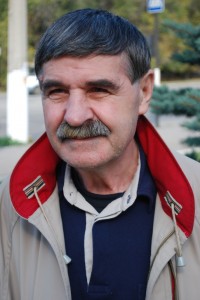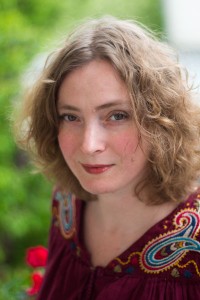Two poems by the Ukrainian poet Vasyl Holoborodko, translated by Svetlana Lavochkina

- Vasyl Holoborodko
Translator’s note:
Ukrainian poetry is often a riddle to foreign readers. It has a strong insider appeal, full of obscure heroes, historical, cultural, and political allusions. Two years ago, I was asked to prepare a selection of Ukrainian poetry for a generational anthology featuring authors born after World War II. For weeks, I tried to find poems that might speak to an international audience, but what I found seemed too dependent on allusion and rhyme until I came across Vasyl Holoborodko’s magical blank verse. An apartment in need of tidying up, a broken motor bike, first love, a conversation with a village neighbor – universal topics, unpretentious diction – yet each of the poems is deeply rooted in Ukrainian ethos.
In 1999, Holoborodko became Laureate of the National Shevchenko Award, the highest Ukrainian literary distinction, and his poems are taught in schools. Still, he leads a hermit’s life in provincial Luhansk. It was impossible to find any personal contact info; he’s notorious for his “complexity of character” and his “reticence.” So how then was I supposed to contact this poet to secure his permission to translate?
I devised an ingenious trick. I called the Mayor of Luhansk’s office. “I’m the Editor in Chief of the American anthology Such and Such,” I lied to his secretary in a solemn voice. My introduction sounded impressive enough for her to put me through to the Mayor, who then gave me Vasyl’s address and telephone number. I called the poet after an hour’s hesitation.
We had a long, cordial conversation. I experienced nothing of the reticence I was warned about and which, taking his dramatic biography into account, Vasyl has every reason for. “I love words,” he told me, “and mine are not fiery – they teem with bees and butterflies.”
Later Vasyl sent me his newest work, which were a pleasure to translate. Some of those poems are presented. In the unglamorous rural setting of his poems everyday things are distilled into their divine essences.
–Svetlana Lavochkina
Хатка на одну людину
by Vasyl HoloborodkoУ цьому селі
у кожній хатці – невеличкій хаті –
– готельному номері на одну особу –
– шпаківні на одного шпака –
– вулику на одну бджолу –
живуть по одному:
не тільки старі, родичі яких давно повмирали,
або з’їхали кудись у світи із села,
а й молоді – різного віку –
жінки й чоловіки, дівчата й парубки та й діти.
У цьому селі
вранці – від кожної хатки –
виганяють на пасовище корову
з одним рогом,
з одним хвостом,
з однією ногою,
з одним оком,
з однією дійкою.
У цьому селі
виходить – із невеликої хатки –
самотній чоловік,
іде по сусідах,
щоб скластися з кимось по гривні
та хоч пляшку купити,
та розпити разом,
але він ніколи нікого не знаходить,
тому наодинці повертається
до своєї хатки – невеликої хати,
а через деякий час із іншої хатки
виходить інший самотній чоловік
з тією ж метою – зустрітися з кимось –
але й цей чоловік нікого не знаходить:
ніколи ніде нікого не зустрічає.
(Епіфанія: не знайти з ким випити –
символ за ознакою: залишитися в самоті,
і далі перебувати самому, ірреальна можливість
спілкування, проблематична для мешканців
маленьких хаток і реальна можливість,
яку усвідомлює автор).
A Hut For One
by Vasyl HoloborodkoIn this village
In every hut – a small hut –
– a single hotel room –
– a nesting box for one starling –
– a hive for one bee –
there live, one of each:
not only the old people whose families died long ago
or moved away into the wide world,
but also young ones – of different ages –
men and women, lassies and lads, and children.
In this village
in the morning – from every hut –
they drive out cows to graze –
cows with one horn,
one tail,
one leg,
one eye,
one teat.
In this village
a lonely man
comes out of a little hut –
knocking at his neighbors’ doors
to stack up a grivnya with someone
and buy one bottle of liquor
to drink together;
but he finds no one,
and returns home alone
to his hut –
a small hut,
and a little later another lonely man
leaves another hut
with the same purpose –
to meet someone –
but this man finds no one:
never, nowhere, no one does he ever meet.
(Epiphany: to find no one to drink with
is a symbol, by definition, of being lonely
and remaining lonely; unreal opportunity
of communication, problematic
for the dwellers of small huts – and a real opportunity
of which the author himself is aware.)
translated from Ukrainian by Svetlana LavochkinaПоштовий голуб
by Vasyl HoloborodkoКучанин, після багатьох років,
під час випадкової зустрічі зі мною,
став розповідати про своїх голубів
(став жаліти своїх голубів)
(Епіфанія: голуб – символ за ознакою
“бути тим, що знаходиться посередині”):
“Пам’ятаєш, у мене колись були голуби,
так мої дівки просто замучили одного голуба –
заманулося їм вивчити його на поштового голуба:
то було прив’яжуть йому до ніжки квітку
якусь із городчика перед хатою,
а як відійдуть квіти,
то ложку, то виделку прив’яжуть,
а як і їх уже не ставало,
прив’яжуть гайку чи гвинтик,
які завжди валялися на подвір’ї
(хіба один раз лагодив свого мотоцикла!) –
та все пускали того голуба летіти
(Епіфанія: квітка – символ за ознакою
“бути тим, що найкрасивіше за все на світі”,
ложка чи виделка, гайка чи гвинтик –
символи за ознакою “бути тим, що мале”).
А голуб із таким листом саме стільки міг летіти,
аби тільки через яр
до стежки на протилежному боці міг долетіти,
а там на стежці завжди сідав.
Чи ти не бачив коли того голуба,
адже ти часто ходив саме тією стежкою за яром?”
“Ні, жодного разу не бачив, мабуть,
він устигав злетіти,
якось відв’язавши дзьобом
свого кожного разу нового листа,
до того часу,
коли я з’являвся на стежці,
хоча інколи мені й кидалися у вічі
то квітка якась із городчика,
то ложка чи виделка,
то гайка чи гвинтик,
але ж я жодного разу не пов’язував
ці знахідки із вашим двором,
із вашими голубами,
із городчиком коло вашої хати,
із вашим вічно ремонтованим мотоциклом”.
“Це тривало того літа,
коли моя менша стала дівкою,
і щойно звернула на тебе увагу
та й думала вже тільки про тебе,
про тебе,
як ти проходиш стежкою за яром”.
Pigeon Post
by Vasyl HoloborodkoI ran into an old village neighbor
who told me about his pigeons
(he empathized with his pigeons).
(Epiphany:
a pigeon, by definition, is
“something which is in the middle”).
“Remember, I used to have a pigeonry,
and my girls wouldn’t let one of the pigeons alone –
they got it into their heads
to teach it homing.
To its leg, they would tie a flower
from the garden by the house,
and when the flowers wilted,
a spoon or a fork;
when they ran out of spoons or forks,
they would tie a nut or a screw
that were always scattered about in the yard
(my motor bike always needed repair!) -
and they would let the pigeon fly.
(Epiphany:
a flower, by definition,
is something “which is the most beautiful thing in the world”;
a spoon or a fork,
a nut or a screw is “something small”).
But the pigeon could not fly far with such a letter:
just over the valley
to the path on the opposite side,
and there on the path it would always sit down.
Did you, perchance, see that pigeon -
you often walked that path beyond the valley?”
“No, not once. Maybe
it managed to fly away,
having somehow undone
every new letter with its beak
before I appeared on the path –
although sometimes
a garden flower,
a spoon or a fork,
a screw or a nut
would catch my eye,
but not once did I connect these
to your orchard,
your pigeons,
your motor bike in eternal need of repair.”
“It all happened in the summer
when my younger girl came of age
and fancied you at once –
she would only think
of you,
of your walking the path beyond the valley.”
translated from Ukrainian by Svetlana Lavochkina
